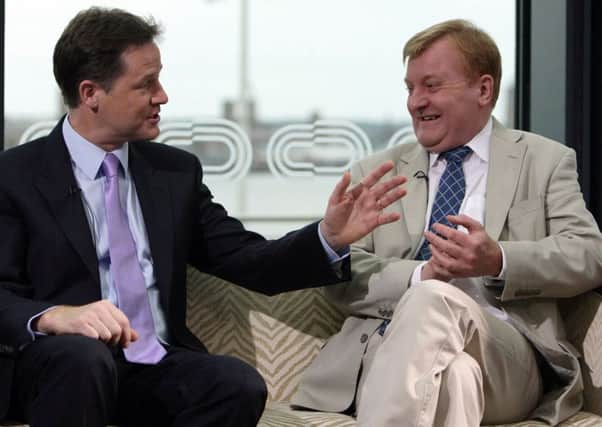Kennedy hailed as a brave and principled leader


His promise was clear when he studied philosophy and politics at Glasgow University. In that famous nursery of political talent he was president of the Union and won the Observer Mace for debating.
His talent for speaking in public, his ability to think on his feet and the sparkling sense of humour stood him in good stead when he began his political career in his early twenties.
Advertisement
Hide AdAdvertisement
Hide AdStanding for the Social Democratic Party (SDP) in 1983, Mr Kennedy defeated the Conservative candidate Hamish Gray to win Ross, Cromarty and Skye – a seat he held until last month.
As the 23-year-old “Baby of the House”, he found himself on the SDP frontbench.
He was one of the few people in the SDP to back its merger with the Liberals. His status as a bright young thing was confirmed when he was elected Liberal Democrat president in the early 1990s. After the 1992 election he found himself on the party’s frontbench, where he enhanced his reputation as an articulate pro-European.
Outside Westminster, his wit meant he was in great demand from broadcasters. He presented the Jimmy Young Show on Radio 2 and was in great demand to appear on the BBC’s Have I Got News for You. His willingness to appear on mainstream TV earned him the nickname “Chat Show Charlie”.
When Paddy Ashdown stood down as Lib Dem leader in 1999, Mr Kennedy defeated Simon Hughes in the battle to succeed him. In 2002, he married Sarah Gurling. The couple had a son, Donald, before the marriage ended in 2010.
Under his leadership, the Lib Dems increased their number of seats from 46 to 52 in 2001. In 2005, he achieved a record number of seats for a Lib Dem leader with 62.
After the terrorist attacks of 11 September, 2001, he positioned the Lib Dems as the only major party against the Iraq War – a decision widely condemned at the time but in the fullness of time became to be seen as a brave and principled stance.
“Opposing the Iraq War was Charles Kennedy’s finest hour,” said the Liberal Democrat Sir Menzies Campbell last night. “It was based on principle. It was based on the view that the invasion was illegal and it was also based on the view that the evidence in favour of there being weapons of mass destruction was pretty sketchy. Of course, in the end, Charles Kennedy and the Liberal Democrats were proved to be right.”
Advertisement
Hide AdAdvertisement
Hide AdAround this time rumours began to surface about the extent of Mr Kennedy’s drinking. He made a number of appearances looking under the weather. Despite the Lib Dems’ strong performance in the 2005 election, there was disquiet. Although he survived after calling a leadership vote, colleagues continued to be concerned.
Finally, in 2006, when told ITN was about to report that he had received treatment for a drink problem, Mr Kennedy resigned. He remained active on the backbenches, but was never tempted back to the frontline.
As someone who regarded himself as firmly on the left of centre, he was a critic of Nick Clegg’s decision to go into government with the Tories in 2010, voting against the coalition.
Last year he worked with the Better Together campaign to secure a No vote in the independence referendum – although there were many who were frustrated he did not play a more prominent role. In 2008, he was elected Rector of Glasgow University.